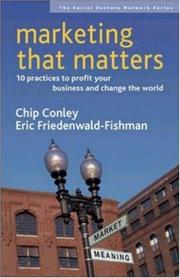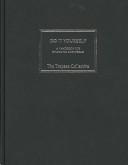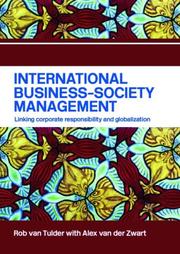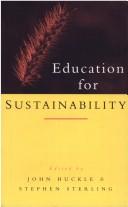| Listing 1 - 10 of 35 | << page >> |
Sort by
|

ISBN: 1282300636 9786612300639 1576759644 9781576759646 9781282300637 1576753832 9781576753835 6612300639 Year: 2006 Publisher: San Francisco, CA Berrett-Koehler Publishers
Abstract | Keywords | Export | Availability | Bookmark
 Loading...
Loading...Choose an application
- Reference Manager
- EndNote
- RefWorks (Direct export to RefWorks)
Written by two down-to-earth, experienced entrepreneurs, this work is an in-the-trenches guide to building a marketing plan that embodies personal values instead of exploiting them.
Social marketing. --- Social responsibility of business. --- Business --- Corporate accountability --- Corporate responsibility --- Corporate social responsibility --- Corporations --- CSR (Corporate social responsibility) --- Industries --- Social responsibility, Corporate --- Social responsibility of industry --- Business ethics --- Issues management --- Cause related marketing --- Marketing, Social --- Social cause marketing --- Marketing --- Social responsibility --- Social aspects

ISBN: 1849643571 9781849643573 0745326382 0745326374 9780745326375 9780745326382 0745348270 Year: 2007 Publisher: London ; Ann Arbor, Mich. : Pluto Press,
Abstract | Keywords | Export | Availability | Bookmark
 Loading...
Loading...Choose an application
- Reference Manager
- EndNote
- RefWorks (Direct export to RefWorks)
A radical guide to ethical and sustainable living.
Environmentalism. --- Environmental responsibility. --- Environmental protection --- Ecological accountability --- Ecological responsibility --- Environmental accountability --- Environmental ethics --- Responsibility --- Environmental movement --- Social movements --- Anti-environmentalism --- Sustainable living --- Citizen participation. --- Greenwashing
Book
ISBN: 0231545851 9780231545853 9780231179522 0231179529 Year: 2017 Publisher: New York
Abstract | Keywords | Export | Availability | Bookmark
 Loading...
Loading...Choose an application
- Reference Manager
- EndNote
- RefWorks (Direct export to RefWorks)
Facing especially wicked problems, social sector organizations are searching for powerful new methods to understand and address them. Design Thinking for the Greater Good goes in depth on both the how of using new tools and the why. As a way to reframe problems, ideate solutions, and iterate toward better answers, design thinking is already well established in the commercial world. Through ten stories of struggles and successes in fields such as health care, education, agriculture, transportation, social services, and security, the authors show how collaborative creativity can shake up even the most entrenched bureaucracies-and provide a practical roadmap for readers to implement these tools.The design thinkers Jeanne Liedtka, Randy Salzman, and Daisy Azer explore how major agencies like the Department of Health and Human Services and the Transportation and Security Administration in the United States, as well as organizations in Canada, Australia, and the United Kingdom, have instituted principles of design thinking. In each case, these groups have used the tools of design thinking to reduce risk, manage change, use resources more effectively, bridge the communication gap between parties, and manage the competing demands of diverse stakeholders. Along the way, they have improved the quality of their products and enhanced the experiences of those they serve. These strategies are accessible to analytical and creative types alike, and their benefits extend throughout an organization. This book will help today's leaders and thinkers implement these practices in their own pursuit of creative solutions that are both innovative and achievable.
Human services --- Public administration --- Management science. --- Social responsibility of business. --- Business --- Corporate accountability --- Corporate responsibility --- Corporate social responsibility --- Corporations --- CSR (Corporate social responsibility) --- Industries --- Social responsibility, Corporate --- Social responsibility of industry --- Business ethics --- Issues management --- Quantitative business analysis --- Management --- Problem solving --- Operations research --- Statistical decision --- Decision-making in public administration --- Management. --- Decision making. --- Social responsibility --- Social aspects --- Management science --- Social responsibility of business --- Decision making --- E-books

ISBN: 0415342414 0415342406 9780415342414 9780415342407 9780203481615 9781134293223 9781134293261 9781134293278 Year: 2006 Publisher: Oxon Routledge
Abstract | Keywords | Export | Availability | Bookmark
 Loading...
Loading...Choose an application
- Reference Manager
- EndNote
- RefWorks (Direct export to RefWorks)
International economic relations --- Globalization. --- International business enterprises. --- Social responsibility of business. --- globalisering --- multinationals --- corporate governance --- concurrentie, internationaal --- imagovorming bedrijven --- duurzaam ondernemen --- bedrijven, ethiek --- Globalization --- International business enterprises --- Social responsibility of business --- Global cities --- Globalisation --- Internationalization --- International relations --- Anti-globalization movement --- Business --- Corporate accountability --- Corporate responsibility --- Corporate social responsibility --- Corporations --- CSR (Corporate social responsibility) --- Industries --- Social responsibility, Corporate --- Social responsibility of industry --- Business ethics --- Issues management --- Business enterprises, International --- Corporations, International --- Global corporations --- International corporations --- MNEs (International business enterprises) --- Multinational corporations --- Multinational enterprises --- Transnational corporations --- Business enterprises --- Joint ventures --- Social responsibility --- Social aspects
Book
ISBN: 9781398606494 Year: 2023 Publisher: London ; New York, NY ; New Delhi : Kogan Page,
Abstract | Keywords | Export | Availability | Bookmark
 Loading...
Loading...Choose an application
- Reference Manager
- EndNote
- RefWorks (Direct export to RefWorks)
Sustainable human resource management (HRM) processes and practices are not a nice-to-have, they're a need-to-have to benefit employees, organizations, societies and the environment. Sustainability has been highlighted by the Chartered Institute of Personnel and Development (CIPD) as one of the key trends influencing the HR profession so Sustainable Human Resource Management is crucial reading for undergraduate and postgraduate HR students. It explains what sustainable HRM is, what the benefits of sustainable HRM are as well as the dangers of unsustainable HRM. It is full of examples throughout to show how sustainable HRM works in practice including how it can be used to improve candidate attraction, retention and employee engagement as well as how it can improve productivity, employer branding, company culture and drive both efficiency and business performance. There is also coverage of how sustainable HRM can be introduced and measured as well as specific guidance on sustainable HRM in different parts of the world, green HRM, responsible business, ethics and sustainable HRM as a business strategy. Sustainable Human Resource Management is written specifically for third year undergraduate and postgraduate students with pedagogical features in each chapter including learning objectives, key concept definitions, skill check boxes, workshop discussion articles, chapter summaries, study questions and key readings. Online resources include a sample course outline, PowerPoint slides and student engagement questions.
Book
ISBN: 9789038224510 Year: 2015 Publisher: Gent Academia Press
Abstract | Keywords | Export | Availability | Bookmark
 Loading...
Loading...Choose an application
- Reference Manager
- EndNote
- RefWorks (Direct export to RefWorks)
De kerndoelstelling van sociale ondernemingen bestaat uit het creëren van sociale meerwaarde, tegelijkertijd moeten ze ook oog hebben voor economische en financiële elementen. Precies dat weinig evidente evenwicht blijkt vaak een struikelblok. Op basis van grondige research ontwikkelden de auteurs het Impact Driven Business Modelling (IDBM): een businessmodel dat de sociale en economische doelstellingen integreert. In dit boek leggen ze stapsgewijs de IDBM-methodiek uit en passen die toe op verschillende interessante cases (o.a. Streetwize, Roof Food). Het resultaat is een handig een werkinstrument voor lectoren en studenten, maar eveneens voor (toekomstige) ondernemers met een innovatief sociaal idee.Bron : http://www.academiapress.be
sociale economie --- Business policy --- MVO (maatschappelijk verantwoord ondernemen) --- Business -- Social responsibility --- CSR (Corporate social responsibility) --- Corporate accountability --- Corporate responsibility --- Corporate social responsibility --- Corporations -- Social responsibility --- ESS (Environnement, santé et sécurité) --- Engagement sociétal des entreprises --- Entreprise citoyenne --- Entreprises -- Aspect social --- Entreprises -- Responsabilité environnementale --- Entreprises -- Responsabilité sociale --- Entreprises -- Responsabilité sociétale --- Entreprises -- Rôle social --- Entreprises citoyennes --- Environnement, santé et sécurité (Responsabilité des entreprises) --- Industrie -- Responsabilité sociétale --- Industries -- Social responsibility --- MVO (Maatschappelijk verantwoord ondernemen) --- Maatschappelijk verantwoord ondernemen --- Ondernemingen -- Sociale verantwoordelijkheid --- RSE --- Responsabilité environnementale des entreprises --- Responsabilité sociale des entreprises --- Responsabilité sociale et environnementale des entreprises --- Responsabilité sociétale des entreprises --- Rôle social des entreprises --- Social responsibility [Corporate ] --- Social responsibility of business --- Social responsibility of industry --- Sociale verantwoordelijkheid van de ondernemingen --- Sociétés -- Responsabilité sociale --- 330.342.146 --- 338.95 --- sociale markteconomie --- Ondernemerschap --- Non-profitorganisaties --- Managementmodellen --- Sociale ondernemingen --- Ondernemen --- sociaal ondernemen --- Sociale ondernemingen. --- sociaal ondernemen. --- Sociaal ondernemen. --- Ethisch ondernemen --- Ondernemingen en maatschappij --- PXL-Business 2016 --- ondernemersstrategie --- businessplanning --- 658.11 --- Non-profitorganisatie --- Managementmodel
Book
ISBN: 9789057123283 Year: 2012 Publisher: Amsterdam Nieuwezijds
Abstract | Keywords | Export | Availability | Bookmark
 Loading...
Loading...Choose an application
- Reference Manager
- EndNote
- RefWorks (Direct export to RefWorks)
Breinwetenschappers zijn het er stilaan over eens dat de vrije wil niet bestaat. Onze bewuste beslissingen zijn de uitkomst van onbewuste processen waarover we geen ultieme controle hebben. De idee dat een bewust ¿ik¿ aan de knoppen zit, is een illusie. Wat zijn de filosofische gevolgen van een onvrije wil?Rationeel beschouwd zijn we niet langer verantwoordelijk voor, of schuldig aan, wat we doen of denken. Verantwoordelijkheid vereist immers een vrije wil ¿ die niet bestaat. Maar zonder schuld verliest het recht zijn klassieke grondslag en zonder blaam kun je niemand iets kwalijk nemen. We zitten met een filosofische waarheid die niet rijmt met onze alledaagse intuïties en emoties.Toch is een leven met een onvrije wil niet zonder perspectief. Op het persoonlijke vlak kan verwijtloos leven bevrijdend werken en op het maatschappelijke vlak dringt schuldloos recht nu al onze samenleving binnen. Professionals beschouwen criminelen als risicoburgers en bestuurders zoeken hun heil bij preventie die geen schuld vereist.Een leven zonder verantwoordelijkheid hoeft geen bedreiging voor de toekomst te vormen. Leven zonder schuld kan zelfs een uitdaging zijn. Met actuele voorbeelden als de ontuchtzaken in de katholieke kerk en kritiek op de prestatiemaatschappij laat Jan Verplaetse zien wat die uitdaging inhoudt.Jan Verplaetse is filosoof en neurowetenschapper. Hij doceert moraalfilosofie aan de faculteit Rechtsgeleerdheid van de Universiteit Gent. Zijn boek Het morele instinct (2008) werd bekroond met de NWO Eureka Boekenprijs.
General ethics --- Accountability --- Moral responsibility --- Obligation --- Responsabilité --- Responsibility --- Verantwoordelijkheid --- Ethiek. --- Vrije wil --- Vrije wil. --- Obligation morale --- Responsabilité (Morale) --- Responsabilité (Philosophie) --- Responsabilité -- Aspect moral --- Responsabilité -- Philosophie --- Responsabilité morale --- ethiek --- 17 --- Ethics --- Philosophy

Abstract | Keywords | Export | Availability | Bookmark
 Loading...
Loading...Choose an application
- Reference Manager
- EndNote
- RefWorks (Direct export to RefWorks)
Objectives of teaching --- Environmental protection. Environmental technology --- Environmental education --- Environmental responsibility --- -504.062 --- Ecological accountability --- Ecological responsibility --- Environmental accountability --- Environmental ethics --- Responsibility --- Education --- Study and teaching --- Protection, rational use, restoration of natural resources. Sustainable development --- Environmental education. --- Lerarenopleiding --- Study and teaching. --- algemeen --- algemeen. --- 504.062 Protection, rational use, restoration of natural resources. Sustainable development --- Algemeen. --- 504.062
Book
ISBN: 9781942130123 1942130120 Year: 2018 Publisher: Brooklyn, New York Zone Books
Abstract | Keywords | Export | Availability | Bookmark
 Loading...
Loading...Choose an application
- Reference Manager
- EndNote
- RefWorks (Direct export to RefWorks)
The extraordinary shift in conduct and orientation--among companies, governments, and individuals--generated by financialization.The hegemony of finance compels a new orientation for everyone and everything: companies care more about the moods of their shareholders than about longstanding commercial success; governments subordinate citizen welfare to appeasing creditors; and individuals are concerned less with immediate income from labor than with appreciation of their capital goods, skills, connections, and reputations. In this book, in clear and compelling prose, Michel Feher explains the extraordinary shift in conduct and orientation generated by financialization.That firms, states, and people depend more on their ratings than on the product of their activities also changes how capitalism is resisted. For activists, the focus of grievances shifts from the extraction of profit to the conditions under which financial institutions allocate credit. While the exploitation of employees by their employers has hardly been curbed, the power of investors to select investees--to decide who and what is deemed creditworthy--has become a new site of social struggle. Above all, Feher articulates the new political resistances and aspirations that investees draw from their rated agency.-publisher's description.
Politique culturelle --- Politique économique --- Capitalisme --- Political philosophy. Social philosophy --- Money market. Capital market --- Investment management --- Finance --- Capitalism --- Social change --- Economics --- Right and left (Political science) --- Social responsibility of business --- Left (Political science) --- Left and right (Political science) --- Right (Political science) --- Political science --- Social aspects --- Sociological aspects --- Business --- Corporate accountability --- Corporate responsibility --- Corporate social responsibility --- Corporations --- CSR (Corporate social responsibility) --- Industries --- Social responsibility, Corporate --- Social responsibility of industry --- Business ethics --- Issues management --- Economic sociology --- Socio-economics --- Socioeconomics --- Sociology of economics --- Sociology --- Change, Social --- Cultural change --- Cultural transformation --- Societal change --- Socio-cultural change --- Social history --- Social evolution --- Funding --- Funds --- Currency question --- Social responsibility --- #SBIB:316.334.2A60 --- #SBIB:316.334.2A460 --- #SBIB:33H041 --- Economische sociologie --- Arbeidssociologie: patronale strategieën: algemeen --- Economische ontwikkelingen en bewegingen
Book
ISBN: 902441086X Year: 1984 Publisher: Baarn Nelissen
Abstract | Keywords | Export | Availability | Bookmark
 Loading...
Loading...Choose an application
- Reference Manager
- EndNote
- RefWorks (Direct export to RefWorks)
filosofie van het welzijnswerk --- sociale ethiek --- welzijnswerkers, beroepsethiek --- welzijnswerkers --- Social workers --- -Social service --- Responsibility --- Helping behavior --- 321.4 --- aansprakelijkheid (verantwoordelijkheid) --- welzijnswerk --- Behavior, Helping --- Human behavior --- Interpersonal relations --- Altruism --- Caring --- Accountability --- Moral responsibility --- Obligation --- Ethics --- Supererogation --- Benevolent institutions --- Philanthropy --- Relief stations (for the poor) --- Social service agencies --- Social welfare --- Social work --- Human services --- Human services personnel --- 361 --- 172 --- 361.05 --- Professional ethics --- Helping behavior. --- Responsibility. --- Social service. --- Professional ethics. --- Social service
| Listing 1 - 10 of 35 | << page >> |
Sort by
|

 Search
Search Feedback
Feedback About
About Help
Help News
News